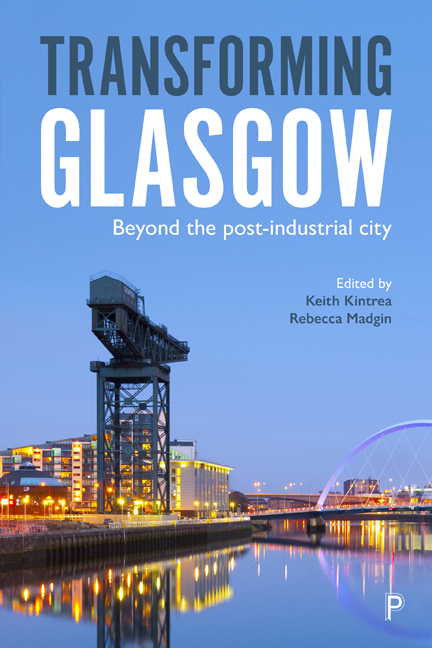Book contents
- Frontmatter
- Contents
- List of Maps, Tables, Figures and Boxes
- Notes on Contributors
- Acknowledgements
- Foreword
- Map
- Introduction: Transforming Post-Industrial Glasgow – Moving Beyond the Epic and the Toxic
- PART I
- PART II
- PART III
- Conclusion: Beyond the Post-Industrial – Narratives of Time and Place
- Index
Foreword
Published online by Cambridge University Press: 25 March 2021
- Frontmatter
- Contents
- List of Maps, Tables, Figures and Boxes
- Notes on Contributors
- Acknowledgements
- Foreword
- Map
- Introduction: Transforming Post-Industrial Glasgow – Moving Beyond the Epic and the Toxic
- PART I
- PART II
- PART III
- Conclusion: Beyond the Post-Industrial – Narratives of Time and Place
- Index
Summary
It is tempting when discussing our city to focus on Glasgow's rich and vibrant history – but in many respects I think this misses the key point in the story. That is of a city that has consistently reinvented itself and – unlike some other cities – has never allowed its identity to remain fixed in previous centuries, or to become a stale relic of the past.
From our roots as a small religious community founded by St Mungo, and becoming a centre for European learning and philosophy on the foundation of the university in 1451, to our role as a great industrial power as the second city of the British Empire and amid the radicalism of Red Clydeside, Glasgow has never been content to be just one thing.
This fluid identity has only increased as immigration from Ireland, Italy, India, Pakistan, China, Poland and so many other countries has given our city new leases of life economically, socially and culturally at various points in the 19th and 20th centuries.
And all this has shaped the Glasgow we know today – a vibrant, multicultural city with many strengths, incredible opportunities, but of course many challenges.
While we are, then, shaped by our past we also have the power to continue to shape our future. A future that will see the city faced with some pressing questions that will determine the next iteration of the Glasgow story.
The overarching question appears to be can we once again reinvent ourselves to succeed economically in the coming decades and centuries, to be pioneers in new and emerging industries and to again be global leaders in finding the solutions to collective, global problems – while avoiding the contradictions of poverty and exploitation which too often underpinned our past success.
Ours is a city which perhaps more than any other of our size, shaped the Industrial Revolution, along with all of the great positive and negative forces that it unleashed.
Can we again marshal our collective economic and social resources to be at the vanguard of the coming green industrial revolution? Can innovative solutions from researchers and industry help repair some of the damage to our planet unleashed in centuries past – all while bringing environmentally friendly jobs and investment to Glasgow?
- Type
- Chapter
- Information
- Transforming GlasgowBeyond the Post-Industrial City, pp. xv - xviiiPublisher: Bristol University PressPrint publication year: 2019



